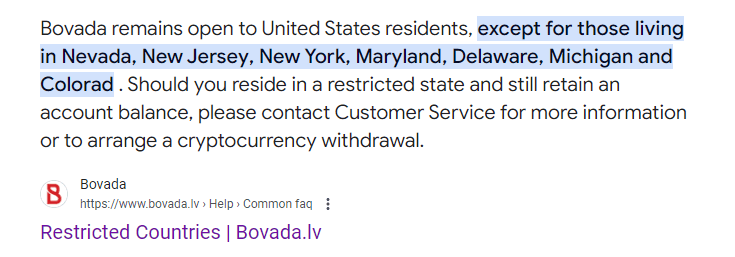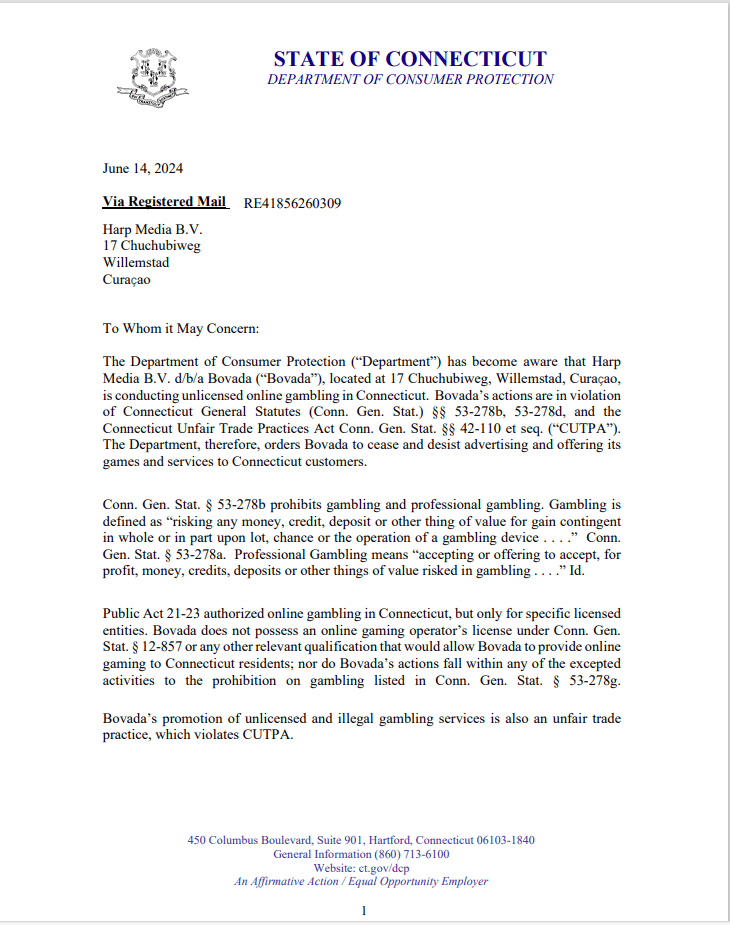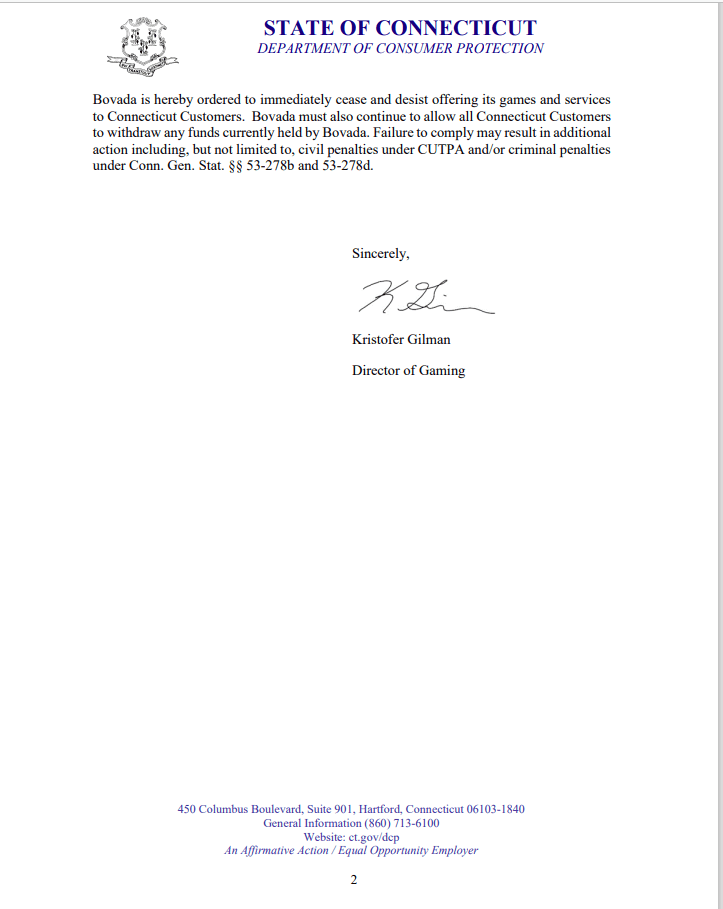
Jan 1, 2024; Pasadena, CA, USA; Michigan Wolverines running back Blake Corum (2) runs in the first quarter against the Alabama Crimson Tide in the 2024 Rose Bowl college football playoff semifinal game at Rose Bowl. Mandatory Credit: Gary A. Vasquez-USA TODAY Sports
- The offshore sportsbook and casino is now restricting access in Michigan and Colorado
- Both Michigan and Colorado sent the operator cease-and-desist letters within the last month
- Connecticut recently sent Bovada a notice as well, but access is still available in the state
Bovada, an offshore and unregulated sportsbook/casino, is no longer available in Michigan or Colorado.
The unregulated gaming operator has pulled its services out of both states after their respective gaming regulators sent its parent company, Harp Media B.V., legal notices to cease operations.
Bovada now restricts access in seven states across the U.S. Connecticut may be next, as the state’s Department of Consumer Protection also sent a notice to the operator last week.
States Taking Notice of Bovada
Bovada is now banned in both Michigan and Colorado, following notices their gaming regulators sent to the operator.
The Michigan Gaming Control Board (MGCB) sent a cease-and-desist letter to the operator on May 29. The gaming control board gave Harp Media B.V. 14-days from the receipt of the letter to prevent Michigan residents from gambling on their websites, or the MGCB will take legal action against the company.
Harp Media B.V. is located in Willemstad, Curaçao.
The gaming control board claims Harp Media B.V. is in violation of several Michigan gaming laws:
- Lawful Internet Gaming Act: States internet gaming may only be offered by a licensed internet gaming operator
- Michigan Gaming Control and Revenue Act: Prohibits a party from conducting a gambling operations without a licensed issued by the MGCB. Parties operating unlicensed gambling operations in the state may face imprisonment for up to 10 years or a fine up to $100,000 or both
- Michigan Penal Code: Broadly prohibits any form of gambling, which generally involves the elements of consideration, prize, and chance. Such as, accepting money, or anything of value, with the understanding that money, or anything of value, will be paid to any person based on the outcome of an uncertain event is prohibited
Colorado has also been added to the list of restricted states on Bovada’s website.

As noted on Bovada’s website, customers living in restricted states can only withdraw remaining funds in their accounts as cryptocurrency.
Connecticut Orders Stop
The Connecticut Department of Consumer Protections officially sent a cease-and-desist letter to Bovada as well. The Department of Consumer Protections alerted Sports Betting Dime today that it sent the notice to Bovada on Friday, June 14.
The letter requires the illegal sportsbook operator to “immediately cease and desist offering its games and services to Connecticut customers” or it may result in civil and/or criminal penalties.
In a letter written by Kristofer Gilman, Director of Gaming in Connecticut, Harp Media B.V. is notified that it is in violation of Connecticut General Statutes 53-278b, 53-278d, and the Connecticut Unfair Trade Practices Act (CUTPA).
Bovada does not possess an online gaming operator’s license in the state, nor do its actions fall within any of the excepted activities to the prohibition on gambling, Gilman wrote in the notice.
“Bovada’s promotion of unlicensed and illegal gambling services is also an unfair trade practice, which violates CUTPA,” Gilman wrote.
As of the publication of this article, Bovada’s services are still open to Connecticut residents.


Rob covers all regulatory developments in online gambling. He specializes in US sports betting news along with casino regulation news as one of the most trusted sources in the country.
In recent news, residents of Michigan and Colorado have been met with restrictions on accessing the popular online gambling platform, Bovada. This decision comes as a result of new regulations put in place by the respective state governments in an effort to crack down on illegal online gambling activities.
Bovada, known for its wide range of casino games, sports betting options, and poker tournaments, has gained a large following in both states. However, concerns over the legality of online gambling have prompted officials to take action to prevent residents from accessing the site.
In Michigan, lawmakers have passed legislation that prohibits online casinos from operating within state borders without proper licensing. Bovada, being an offshore gambling site, does not fall under the jurisdiction of Michigan’s gaming laws and therefore is not permitted to offer its services to residents of the state.
Similarly, in Colorado, regulators have also taken steps to restrict access to Bovada and other unlicensed online gambling platforms. The state’s Division of Gaming has issued warnings to residents about the risks of using illegal gambling sites and has urged them to only gamble with licensed operators.
While these restrictions may come as a disappointment to fans of Bovada in Michigan and Colorado, they serve an important purpose in protecting consumers from potential scams and ensuring that online gambling activities are conducted in a safe and regulated manner. By limiting access to unlicensed sites like Bovada, state officials are working to safeguard the integrity of the gaming industry and prevent illegal activities from taking place.
In response to these restrictions, Bovada has stated that it is committed to complying with all applicable laws and regulations and will continue to monitor developments in Michigan and Colorado. The site has also advised users to check their local laws before engaging in online gambling activities to ensure compliance with state regulations.
Overall, while the restrictions on access to Bovada may be frustrating for some residents of Michigan and Colorado, they are ultimately in place to protect consumers and uphold the integrity of the gaming industry. By following the guidelines set forth by state regulators, individuals can ensure that they are engaging in legal and safe online gambling activities.
